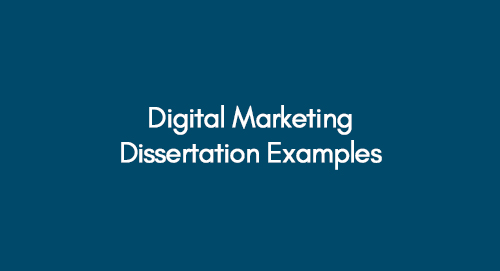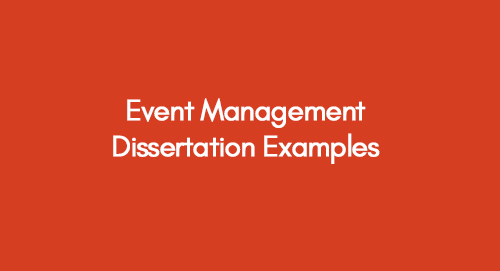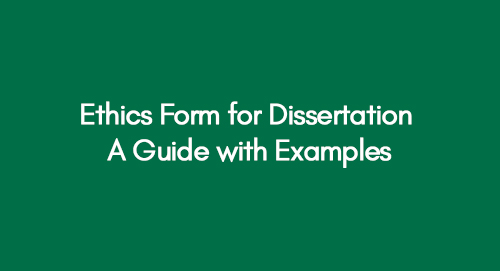
Top 2 First-Standard Digital Marketing Dissertation Examples
May 4, 2023
Case Study Research Examples
May 4, 2023Event management is the study of management that refers to the process of planning, organising, promoting, and executing events. Its professionals oversee all aspects of the event, from initial planning and preparation to post-event evaluation.
Effective event management requires creativity, communication, attention to detail, and problem-solving skills. With the rise of the event industry in recent years, students who enjoy creativity and problem-solving have become keenly interested in this career path.
Check Out Our Event Management Dissertation Topic Page
Get 3+ Free Event Management Dissertation Topic Within 24 Hours
If you are a student or professional in the field and seeking to expand your knowledge, this guide will provide the essential steps to writing an expert event management dissertation.
By following the guidelines outlined in this guide, you can produce a standout dissertation showcasing your expertise in the field and contributing to the broader understanding of the field.
Visit our outstanding event management dissertation examples below:
Example 1: Interventions of Stress Management in the Aviation Industry
Example 2: Challenges of Encouraging Waste Reduction in Construction Projects
Note: Below is a complete guide with some more examples and tips for you to ace the skill of dissertation writing in healthcare.
What is Event Management Dissertation?
Event management is a broad field of managing events from planning to end. An event management dissertation could focus on a wide range of management topics, such as event marketing, event sustainability, event technology, and event risk management.
The dissertation allows students and researchers to contribute new insights and knowledge to the field. It requires identifying a research question or problem and presenting the results in a clear and well-structured manner.
Event management dissertations also relate to hospitality or tourism management. Purse by individuals seeking to advance their knowledge and expertise in the field or to make a meaningful contribution to the profession.
Event Management Dissertation Examples
Examples showcase the diversity of topics and approaches within event management research. We provide a list of bachelor, master, and PhD dissertation topics to help students and researchers write the standout dissertation.
Bachelor Event Management Dissertation Examples
- The Impact of Social Media on Event Marketing: A Case Study of Music Festivals
- Sustainability in Event Management: Practices and Challenges
- Event Sponsorship: Motivations and Outcomes for Corporate Sponsors
- The Role of Technology in Event Management: Opportunities and Challenges
- Event Security and Risk Management: Best Practices and Case Studies
- Cultural Diversity in Event Management: Challenges and Opportunities
Master Event Management Dissertation Examples
- Destination Event Management: A Study of Host Communities' Perceptions and Attitudes
- The Role of Experiential Marketing in Event Management: A Case Study of Sports Events
- Green Event Management: Best Practices and Implementation Strategies
- Event Innovation: Strategies and Outcomes
- Event Tourism: Impacts and Management Strategies
- The Role of Leadership in Event Management: A Study of Leadership Styles and Their Impact on Event Success
PhD Event Management Dissertation Examples
- Event Policy and Regulation: A Comparative Study of Global Approaches
- The Role of Emotional Intelligence in Event Leadership: A Study of Event Managers' Emotional Intelligence and Its Impact on Event Success
- Strategic Event Management: A Framework for Planning, Execution, and Evaluation
- The Role of Events in Community Development: A Study of Community-Based Events in Rural Areas
- Event Stakeholder Management: Best Practices and Challenges
- The Future of Event Management: Trends, Opportunities, and Challenges
Methodologies for Writing an Expertly Researched Event Management Dissertation
Writing an expertly researched event management thesis requires a systematic and organised approach to conducting research and analysing data. Here are some methodologies to guide you towards writing a high-quality dissertation:
-
Conduct a Literature Review for Event Management Thesis Topics
After selecting an event management dissertation title, review the existing literature, including theories, frameworks, and previous studies on the topic. It gives you a solid foundation for your research and helps you identify any research gaps that need to be addressed in your dissertation.
-
Choose the Right Research Method for Thesis Event Management
Your chosen research method depends on the research questions you want to answer, the type of data you need to collect, and the available resources. Common research methods for event management dissertations include surveys, interviews, focus groups, and case studies also more helpful
-
Use Primary and Secondary Data
To ensure your dissertation is expertly researched, use both primary and secondary data sources. Primary data refers to data you collect through surveys, interviews, or other methods. Secondary data refers to data already collected and analysed by others. This includes academic journals, government reports, and industry publications.
-
Analyse Your Data
Once you have collected your data, analyse it using appropriate statistical methods and techniques. This will help you draw meaningful conclusions from your data and answer your research questions.
-
Use a Structured Writing Approach
Finally, use a structured approach to writing your dissertation. Start by creating an outline that includes your introduction, literature review, research methodology, results, discussion, and conclusion. Use clear, concise language and provide references to support your arguments.
Connect With Writer Now
Discuss your requirements with our writers for research assignments, essays, and dissertations.
Event Management Dissertation Example: A Case Study
Topic: Sustainability in Event Management: Practices and Challenges
Abstract
This study explores the current practices and challenges of sustainability in event management. The research methodology includes a comprehensive literature review and semi-structured interviews with event management professionals. The study finds a growing awareness and commitment to sustainability in event management, with many events adopting sustainable practices such as waste reduction, energy conservation, and carbon offsetting. However, there are still significant challenges, including the lack of consensus on sustainable event management, the difficulty of measuring the impact of sustainability initiatives, and the cost and availability of sustainable products and services. The study concludes with recommendations for improving sustainability practices in event management, including clearer guidelines and standards, greater collaboration and knowledge-sharing among industry stakeholders, and a focus on long-term sustainability goals rather than short-term gains.
Literature Review
Sustainability is an important concept in event management to reduce events' negative environmental and social impact. Current practices include waste reduction, energy conservation, water conservation, and carbon offsetting. Studies show that sustainable practices positively impact the environment and society, such as reducing carbon emissions, waste, and water consumption in the Olympic Games Ristic et al. (2020). Additionally, sustainable practices find to positively impact the image and reputation of event organisers (Andereck et al., 2011). Event managers are increasingly adopting sustainable practices to reduce the negative impact of events on the environment and society. However, there are several challenges that need to be addressed to improve sustainability in event management. These include the lack of consensus on sustainable event management, the difficulty of measuring the impact of sustainability initiatives, and the availability and cost of sustainable products and services. Addressing these challenges will require collaboration among industry stakeholders, the development of clear guidelines and standards, and focusing on long-term sustainability goals.
Methodology
The research design for this study is a mixed-methods approach that includes a comprehensive literature review and semi-structured interviews with event management professionals. Use two primary methods for collecting data: literature review and semi-structured interviews. We examine academic databases, industry publications, and government reports during the literature review. The data collected from the literature review and the semi-structured interviews use a thematic analysis approach. Ethical considerations were taken into account throughout the research process, including informed consent, confidentiality, anonymity, and following ethical guidelines for research involving human subjects.
Conclusion
This study explores sustainability's current practices and challenges in event management, including waste reduction, energy conservation, water conservation, and carbon offsetting. Challenges include a lack of consensus on sustainable event management. They also include the difficulty of measuring the impact of sustainability initiatives and the availability and cost of sustainable products and services. Collaboration among industry stakeholders is necessary, and clear guidelines and standards are needed for sustainable event management. Future research explores innovative and effective sustainable practices for event managers.
Final Thought
Writing an expertly researched dissertation on event management requires careful planning, thorough research, and effective writing. To ensure the validity and reliability of the research, appropriate research methodologies and data collection methods should be selected. Strong writing skills and effective communication are essential for the dissertation's success. Despite the potential benefits of contributing to event management, gaining valuable research skills, and demonstrating expertise in the field, writing an expertly researched dissertation on event management is worthwhile.
Get an Immediate Response
Discuss your custom requirements with our writers
Free Online Plagiarism Checker For Students
We will email you the report within 24 hours.
Upload your file for free plagiarism





























